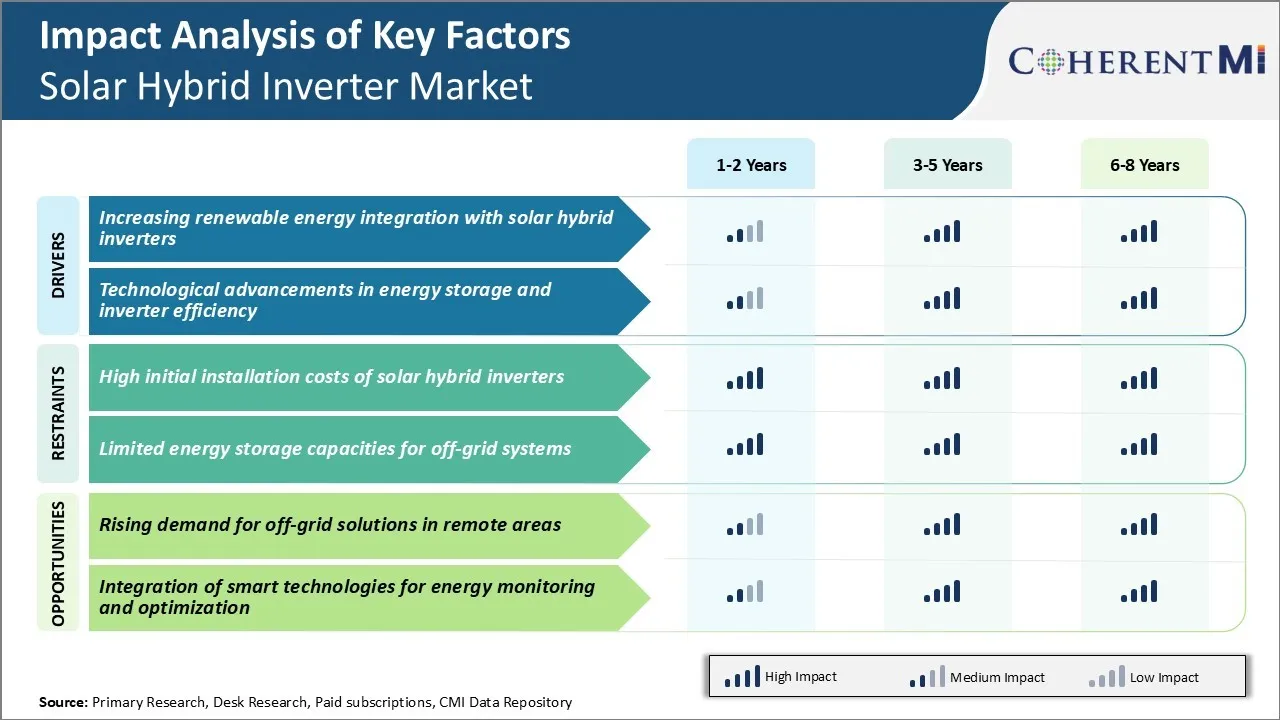Solar Hybrid Inverter Market Trends
Market Driver - Increasing Renewable Energy Integration with Solar Hybrid Inverters
Concerns around climate change are pushing focus on making a shift towards cleaner energy sources. However, the intermittent nature of renewable sources poses integration challenges with existing power grid infrastructure. To address this issue, solar hybrid inverters have emerged as an effective solution that enables better utilization of renewable energy.
Several governments across Europe and Americas have introduced regulatory policies that encourage deployment of battery storage systems for improved integration of solar and wind power. This is positively impacting the demand for solar hybrid inverters that facilitate two-way power flow and ensure stable utilization of renewables.
Many large commercial and industrial facilities are incorporating on-site solar-plus-storage systems powered by solar hybrid inverters. Several utility scale solar-plus-storage power projects have also come up recently leveraging the unique benefits offered by solar hybrid inverters. Consequently, there will be rising need of technologies like solar hybrid inverters that can ensure optimal utilization of intermittent solar power resources.
Market Driver - Technological Advancements in Energy Storage and Inverter Efficiency
Rapid technological progress in areas of lithium-ion battery technology, inverter design and power electronics is continuously enhancing the technical capabilities and driving down the costs of solar hybrid inverter systems. On the inverter front as well, continuous R&D is enabling higher power ratings, greater efficiencies and new functionalities like integrated MPPT and EV charging support in solar hybrid inverters.
Advent of innovative battery chemistries beyond lithium-ion is also on the horizon. Similarly, emerging areas like artificial intelligence, IoT and predictive algorithms are finding various applications. It includes advanced inverter controls, predictive maintenance, demand-side-management, and other areas that can optimize renewable energy usage even further.
With sustained R&D investments, solar hybrid inverter technology may evolve to meet the exponentially growing requirements from renewable energy and e-mobility domains. This brisk pace of innovation will continue driving global demand for the next generation of advanced solar hybrid inverters.

Market Challenge - High Initial Installation Costs of Solar Hybrid Inverters
One of the major challenges currently being faced in the solar hybrid inverter market is the high initial installation costs required for these systems. Solar hybrid inverters provide reliable off-grid power and reduce long term energy costs compared to diesel generators. However, the upfront capital expenditure for installation can be prohibitively expensive for many potential customers. The high costs are associated with not only the inverters themselves but also the battery backup systems required as well as professional installation services.
For residential and small commercial applications in particular, initial costs often exceed budgets even with available subsidies and incentives. This high cost barrier prevents greater adoption of the technology, especially in developing markets where energy access is most needed. For the market to continue strong growth, solutions need to be found to lower installation prices through measures like mass production economies of scale, standardization of components, and innovative financing options that spread costs over the lifespan of the system. Addressing high upfront costs will be key to unlocking the full market potential of solar hybrid solutions.
Market Opportunity - Rising Demand for Off-grid Solutions in Remote Areas
One major opportunity for the expanding solar hybrid inverter market is the rising global demand for off-grid renewable energy solutions in remote areas that are not connected to centralized electricity networks. Vast regions exist without access to reliable power from the conventional grid. These remote communities currently rely heavily on costly and dirty diesel generators for electricity needs.
As the drawbacks of diesel become more prominent, there is a growing market need for clean, affordable and sustainable alternatives. Solar hybrid inverters are well-suited to provide such alternatives through modular systems that can power everything from homes and enterprise to community infrastructures.
With their ability for seamless integration of solar and storage, solar hybrid inverters present a marketable solution for expanding energy access to unelectrified populations worldwide. Enterprises targeting remote communities can capitalize on this opportunity for rapid market growth by innovating adapted product offerings tailored to energy needs in off-grid areas.